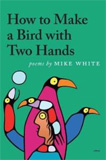October 5, 2012HOW TO MAKE A BIRD WITH TWO HANDS
Review by Erica Goss
The Word Works
P.O. Box 42164
Washington, DC 20015
ISBN: 978-0-915380-81-7
2012, 85 pp., $15.00
www.wordworksdc.com
“Poetry clarifies our loneliness, restores texture to life’s flatness and abysses, makes the world bigger, and closer.” So wrote Daisy Fried in a recent (8/19/12) New York Times review of Maureen N. McLane’s My Poets. Mike White’s first collection of poems, with its fearless explorations of childhood, nightmares, and the minutia of everyday life, brings the world very close, revealing oddness in the quotidian the way a microscope makes the invisible suddenly huge under the lens.
“God in the Details” illuminates the tiny world of ants, who “carry their dead // in the ceremonial style / of a great long poem.” The world of ants is larger than ours, we realize as we read the poem: “and how heavy / is an ant // when I am myself / a shadow borne // so lightly.” As in so many of White’s poems, the speaker delivers these truths in a voice that is straightforward and unadorned, and all the more powerful for its lack of decoration.
White’s ability to describe fantastic, impossible (except in poetry) situations in plain language is one of the collection’s strengths. From “Pair”:
Go find your mother’s legs
was like
Go clean your room.Except you had no room.
That was the difference.
These poems exist in a universe where the commonplace turns upside down on a regular basis. For example, “Outer Space,” which begins with the stanza:
And it is difficult
to get abducted
even in a cornfield.
“Outer Space” simmers with an unspoken desire to be the one–or, more likely, The One, holy and special–who is chosen: “we have been / expecting you / they always say.” But “they” are not, as it turns out, really interested in the speaker. When he confesses “it is the inner space / that hurts the most,” he finds that “the translator / is preoccupied, / fiddling at the controls.” The poem delivers a chilling vision of someone who longs for understanding and connection, but ends up being regarded as a specimen, echoing Fried’s declaration that “poetry clarifies our loneliness.”
White often sets up his poems with negative (though gentle) declarations: “happiness may not be communicable” (“Go Around”), “not a remarkable wind” (“Wind”) and “not rolling in liquid fire” (“NASCAR”). The “nots” promise insights, as in “Go Around”: “Happiness may not be communicable. / Yet there are cables underground. / Have you seen the men digging?”. In “Wind,” they illustrate White’s skill at transforming the most ordinary occurrence into something strange and wonderful: a “suddenly free” patio umbrella becomes “creaturely, great-winged, / and now so carefully gathered in.” White’s use of negative declaration also creates distance; the poems deliver the news a la Williams with a voice that manages to be both whimsical and detached.
In “Invitation,” White captures the ambivalence of one boy reflecting on the death of another:
To the boy not me
who drowned
in the swollen river
and who returned
for a month of nights
riding my borrowed bikeI say come again
inside and get warmnow we are older
the river is dry
let us put aside our differences
Who doesn’t remember the emotional blasts of terror and relief we experienced as children when a disaster happened to someone else? “Invitation” describes a child’s half-developed conscience, waking up years after the traumatic event (“now we are older”). “Let us put aside our differences” tells us that a relationship existed between the dead and live boys, whether real or imagined, and that it’s not finished.
Mike White’s poems often feel precarious, balanced on the line between humor and terror. Some, like “Crow,” left me searching the page for the rest of the poem. White uses blank space to his advantage, especially in “Berryman” and “Incarnate,” in which double-spaced lines slow and enhance the reading experience. Some poems are very funny: “you can’t fan your wad in public” (“Genitalia”), “ducks are with us” (“Crossing”), “running away so fast with my pants on” (“Middle Age”).
The book’s last section contains darker, more reflective poems, with death at their core. An example is “Flo,” which, in spite of its brevity, evokes a dying woman’s inner world:
I am fed through a tube.
Soon it will get dark.
I lie still
and everything moves
in my direction.
Flo’s world has shrunk to one thing: waiting for darkness. In “Bird,” a “brain- sick bird” entertains a crowd with “some old dream of flight” until the unthinkable happens: “someone gasps out laughing.” The laugh makes the poem real, pulling the reader into a place both awkward and recognizable.
How to Make a Bird With Two Hands questions our assumptions and startles us with its close-ups of daily life. The poems in this book are funny, painful and strange, and recast the everyday world as a place where anything can–and does–happen.